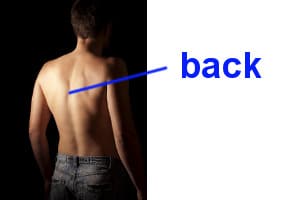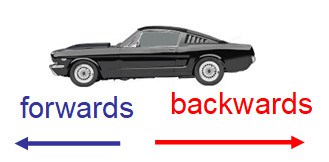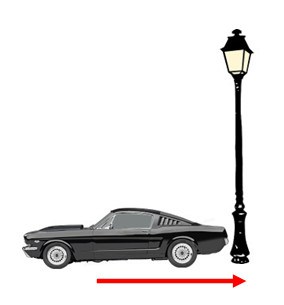Pronunciation: /bæk/
“back” is a very common word in English. We use “back” in many different situations.
“back” is a noun, verb, adjective and adverb. Let’s look at each one.
back as a noun
There are two uses of “back” as a noun:
- Part of the body.
- Opposite of “front”.
Let’s look at each one.
Part of the body
“back” is part of the body as per this photograph:

Examples:
He is lying on his back.
David is scratching his back.
The opposite of “front”
“back” is the opposite of “front”.
“back” describes part of an object that is the furthest from the front.
Examples:

The driver is at the front of the bus.
Mark is at the back of the bus.
This is the back of Mark’s hand.

There is a towel on the back of the chair.
I found my pen in the back of the drawer.
“back” as a verb
There are two uses of “back” as a verb:
- To support someone or something.
- To reverse or move backwards (opposite of forwards).
Let’s look at each one.
support someone or something
Meaning: To give support to someone or something with money or words.
Examples:

Jane: My colleagues backed my idea during the meeting.
I asked the bank for a loan but they are refusing to back me.
The politicians backed the Prime Minister’s plans.
to back up
Meaning:
To reverse a car.
To drive a car backwards (opposite of forwards).

Example:
Your car is blocking the entrance. Please back up a few metres.
to back into something
Form: back into something
Meaning: To crash into something while moving backwards.
Example:

Mark: I had a car accident yesterday.
Jane: What happened?
Mark: I backed into a lamppost!
back as an adjective
“back” as an adjective describes position. The meaning is the opposite of “front”. We write “back” immediately before the noun.
Examples:
Here is the back garden. and here is the back door.

There is a coat on the back seat of the car. Is it yours?
“back” as an adverb
An adverb modifies a verb. “back” modifies lots of verbs in English and it is this use that causes most confusion to learners of English.
The general meaning of “back” as an adverb is “return”.
In this section we will look at the following verbs and structures:
- go back
- put back
- take back
- carry back
- look back
- doing the same action to someone
- call back
- write back
Let’s look at each one in detail.
go back
Meaning: Return to a previous place.
Example:
7 o’clock – Mark leaves home and he goes to London:

10 o’clock – Mark leaves London and he goes back home:

put back
Form: put something back
Meaning: Return an object to a previous place.
Example:
I have taken the keys from your bag. I will put them back later.

take back
Form: take something back
Meaning: Return an object to a previous place.
Example:
The gloves are the wrong size. I am going to take them back to the shop.

carry back
Form: carry something back
Meaning: Return an object to a previous place by carrying it.
Example:
Mark is carrying the boxes back to the lorry.

look back
Meaning: Look behind you
Example:
I was walking in the park. I heard a loud noise behind me. I looked back and I saw a dog.
doing the same action to someone
We also use “back” as an adverb to describe doing the same action to someone in return. Someone does an action to you and you do the same action in return. You do it back to them.
Examples:

Jane shouted at Mark and he shouted back at her.
Jane kissed Mark. Mark kissed Jane back.
“If you kick me, I will kick you back!”
call back
Form: call someone back
Meaning: To return a phone call to someone.
Example:
Jane: “Hi Sarah.”
Sarah: “Hi Jane. I can’t talk now. I will call you back tonight.”
write back
Form: write back to someone
Meaning: To reply to someone in writing.
Example:
Manager: We have received an email from Mr Jones.
Jane: Yes I know. I will write back to him later.
More English lessons
English lessons on our Youtube channel
Meaning and use of “to be used to”
English expressions with the verb KEEP
Meaning and use of STILL in English
Irregular verbs in English
List of all lessons


Haifa says
What about “He is back”, is back an adverb or an adjective here?
Youssef says
Hi,
I think back here is an adverb,
Kind regards.
Yus,
Maxim says
I am not sure in that. Because you may say: “I am late” – late is adjective, is not it? Therefore you may say as well: “I am back”. Am I right, what do you think? If I am not right then say your argumented point.